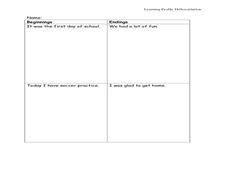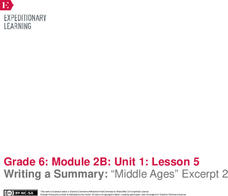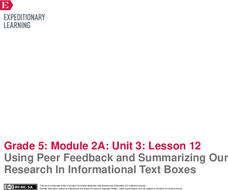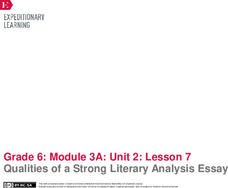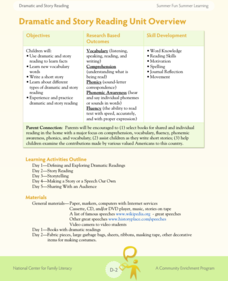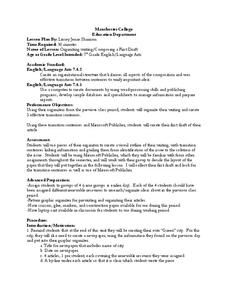Curated OER
Effective Writing is More Than a Five Paragraph Essay
Groups become experts in one aspect of the six traits of writing, prepare a PowerPoint presentation, jigsaw, and teach others about their trait. Writers then focus on these traits as they compose a persuasive essay about a person they...
Curated OER
Writing Strategies
Young writers complete a unit of activities to learn and use writing strategies. They will complete 8 activities to prewrite, use descriptive words, asking and telling sentences, and correct spelling within their writing. Then they watch...
Curated OER
Harmony and Expression in Writing Form
How do you write an interesting beginning, middle, and end of a story? With this lesson, young writers look to other stories as examples. Then, they use some of the attached graphic organizers to help them create their own story. Note:...
Santa Ana Unified School District
Getting to the Core: Early American Poets
How do poets convey emotion and represent their views of life? Pupils learn more about Whitman and Dickinson through the unit and analyze their bold reinvention of craft and style for poets to come. Looking at classic pieces such as...
Norwich Institute for Language Education
Simple Machines
Planning a unit on simple machines? Save some time and energy with this collection of lessons and activities that explores how these devices are used in the real world to make life a little easier.
Bill of Rights Institute
Preserving the Bill of Rights
Consider how America's founding fathers and their experiences contributed to the rights we all enjoy today. A collection of reading, writing, and collaborative exercises prompt high schoolers to think about the ways their current lives...
Core Knowledge Foundation
Kindergarten Skills Unit 9
This unit explores uppercase letters and tricky high-frequency words. Over 23 lessons, scholars review decodable and high-frequency words, examine and practice writing uppercase letters, and work with a new tricky high-frequency word....
British Council
Unit 4: Starting and Finishing Emails
Time to get started, and finish up! Budding business scholars get wise to the ways of beginning and ending e-mails. The fourth lesson in a series of nine career education and skills activities examines formal versus informal ways of...
EngageNY
Writing a Summary: “Middle Ages” Excerpt 1
What's this all about? Scholars learn the importance of summarizing skills using a summary writing graphic organizer. They work with an elbow partner to discuss summaries and complete the organizer using Middle Ages Excerpt 1. Learners...
EngageNY
Writing a Summary: “Middle Ages” Excerpt 2
What is the big idea? Scholars use Middle Ages Excerpt 2 to complete a summary graphic organizer. They then use the information from the organizer to write a summary of the text on lined paper. Learners share summaries with the class.
EngageNY
Using Peer Feedback and Summarizing Our Research In Informational Text Boxes
Insert text box here. Learners use index cards to create their own informational text boxes. The text box includes information about an insect in the rainforest. Scholars also complete the draft of their research science journal entries.
EngageNY
Qualities of a Strong Literary Analysis Essay
Read like a writer. Scholars read a model literary analysis in preparation for a similar writing assignment before annotating each paragraph for the gist. Next, pupils devise a list of qualities of a strong literary analysis essay.
EngageNY
End of Unit Assessment: Text-Dependent Questions and Draft Editorial: The Mary River Project on Baffin Island
Scholars complete an assessment, read an informational article, and answer text-based questions. Also, pupils use the Painted Essay technique to write a draft editorial about a topic they studied throughout the unit, the Mary River Mine...
National Center for Families Learning
The Summer Fun Summer Learning Poetry Unit
Focus on poetry this summer to enhance those comprehension, fluency, and language skills with a set of resources intended to explore different types of poetry, specifically lyric poetry. The daily activities contain differentiation ideas...
EngageNY
Writing an Argument Essay: Developing Claims and Reasons
Scholars begin working on the end-of-unit writing prompt for Pygmalion. They must analyze their collected text evidence to determine what information is compelling enough to include in their argumentative essays. The teacher guides them...
EngageNY
Mid-Unit Assessment and Establishing a Context for My Hero’s Journey Narrative
How do writers engage their readers in a story? Pupils consider the question and use the informational text, "The Hero's Journey" to justify their plan for their own fictional narrative. To that end, scholars write an explanatory...
Dream of a Nation
Read, Watch, Write for Pathos, Logos and Ethos
Encourage your young citizens to make a difference. Using Tyson Miller's Dream of a Nation: Inspiring Ideas for a Better America as a starting point, class members watch documentaries, investigate issues, and then write letters to...
National Center for Families Learning
The Summer Fun Summer Learning Dramatic and Story Reading Unit
What's the difference between story reading and story telling? Participants in a summer enrichment program learn all about the difference as they listen to famous speeches, engage in dramatic readings, and craft their own short stories...
Fluence Learning
Writing an Argument: Persuasive Speeches to Students
Powerful orators make their messages compelling with a combination of factors. Learn how to be an inspirational speaker with a reading assessment activity that presents a list of persuasive speaking techniques, as well as two speeches...
Curated OER
Organizing Writing/Composing a First Draft
Does your language arts class have a hard time with writing transitions? Use this organizational writing lesson to create three effective transition sentences that middle schoolers will use in their research of renewable resources.
EngageNY
Mid-Unit Assessment: Notes and Graphic Organizer for a Letter to a Publisher
It's the halfway point! Scholars complete a mid-unit assessment to showcase their knowledge and skills so far. They create a graphic organizer, write an opinion about how their athlete created a legacy, and then record the best reasons...
EngageNY
Informational Essay Planning: Analyzing and Selecting Evidence
Class members look again at the end-of-unit essay prompt for A Mighty Long Way. After reviewing the requirements of the essay, they use their Gathering Evidence note-catchers and color-code the evidence that matches the two questions in...
EngageNY
Mid-Unit Assessment: Analyzing an Author’s Argument and Text Structure
William Shakespeare: a writer, a poet, a fake? For their mid-unit assessments, scholars read an excerpt from the article "The Top Ten Reasons Shakespeare Did Not Write Shakespeare" by Keir Cutler. Next, they analyze the author's argument...
EngageNY
End of Unit Assessment: Presentation of Position
What is the difference between formal and informal language? Pupils rewrite their position speeches to adapt them for an audience of adults. Next, they present their speeches in small groups, attempting to answer the question, "Which...




